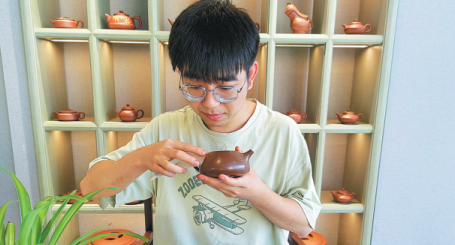Skilled potters resurrect ancient craft in county
Updated: 2023-06-16

A craftsman works on a zisha teapot at his studio in Xiangning county. [Photo by Yue Huanxiang for China Daily]
When mentioning zisha – or purple clay – pottery, many people think about the city of Yixing in East China's Jiangsu province, which is renowned as a base for the industry.
But there is an equivalent in North China: Xiangning in Shanxi province.
Wang Zhiming, 70, is one of the master craftsmen in Xiangning's zisha pottery industry. He said the county has a millennia-long history of pottery making.
"We believe local pottery production can be traced back to the Neolithic Age," Wang said. "And this belief has now proven to be true with the discovery of kiln sites identified as relics of 6,500 years ago."
He added that zisha pottery production became popular locally in the Han dynasties (206 BC-AD 220) and the industry sustained its prosperity throughout the years that followed. "We have kiln sites discovered in Xiangning for almost every dynasty to follow," Wang said.
He added that the time-honored industry is backed by rich purple clay resources in Xiangning. Proven reserves of the material are about 2 billion metric tons.
The industry's prosperity continued until the 1980s, when local products were sold throughout China and Southeast Asian countries. Wang, who was the chief of a local zisha factory in the 1980s, said that purple clay tea sets, tableware and ornaments were sought after during that decade, enjoying a similar reputation with those from Jiangsu's Yixing.
But the industry began to decline because of outdated operational models of local producers. The last purple clay pottery maker in Xiangning shut down in 2008.
Local craftsmen left their hometown to find jobs in other zisha production locales in China. By doing so, they learned new methods of operation, mastered new technologies and techniques in the enterprises they worked, and they began to think about revitalizing the industry in Xiangning a couple of years ago, according to Wang.
On their return to Xiangning, those craftsmen proposed developing a dedicated industrial park for the sector. The park, called Zisha Town of Xiangning, was launched in the village of Zhangma in 2019.
To date, the park is home to five enterprises in zisha pottery production, which has created more than 200 jobs for locals.
Despite its small scale, Zisha Town of Xiangning was included in a list of Shanxi's characteristic towns released by the provincial government in September 2022.
Insiders said the listing is the provincial authorities' endorsement of the well-preserved ancient production techniques in Xiangning and the industry's market potential.
They said Xiangning should capitalize on the listing as an opportunity to increase the brand recognition of local products and promote development of the industry.
Zhang Zhigang contributed to this story.



